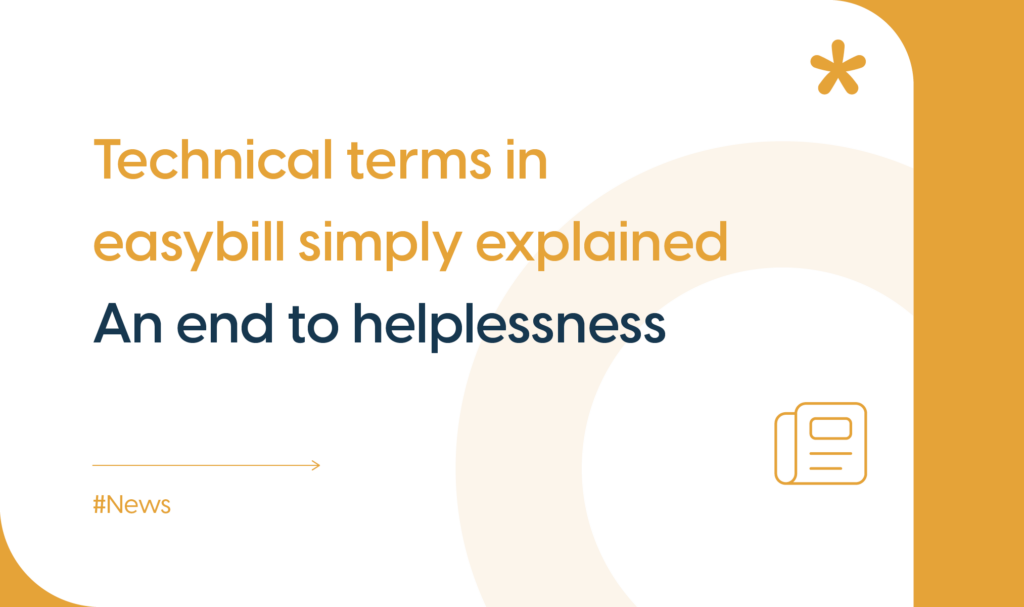
Why you should understand technical terms in easybill? It is crucial to understand the technical terms used in your software in order to work effectively with it. In this blog, we will explain the basic terms and what they mean. We will also show you how knowledge of these terms can improve your work with the software.
Have you never heard one or two of these terms before or read them within easybill? At the end of the blog you will find resources to deepen your knowledge of easybill terms or features as well as practical applications in your everyday work. Become an easybill expert!
Table of content
- Why is it important to understand the technical terms of your software?
- The most important technical terms in easybill
- Import Manager
- Batch processing
- Invoice items
- Gross document
- (REST) API
- Webhooks
- Tips for reading up on new technical terms in easybill
- Conclusion
Why is it important to understand the technical terms of your software?
It is not uncommon for technical terms within software to cause confusion. It can quickly happen that you feel at a loss and don’t know what is meant. But why is it important to understand these terms in the first place? It’s simple: only those who understand the terminology can work effectively with the software and make their day-to-day work easier.
What’s more, many of these terms are industry-specific and can have different meanings depending on the context. A solid understanding of the most important terms within easybill is therefore crucial for your use of easybill.
The most important technical terms in easybill
In order to use your software optimally, it is essential to understand the technical terms. Only then can you work effectively with the various functions and settings. But what do all these terms actually mean? Below you will find an explanation of the most important basic terms in easybill. These and other technical terms will help you to better understand the relationships within the software or new functions.
Import Manager
Contrary to what you might think at first glance, the Import Manager does not import customer data or other data from third-party systems that you have previously used, for example. It is also not responsible for importing your existing article lists or similar.
The Import Manager is a separate tool in easybill for e-commerce. It can be used to connect store systems and marketplaces in order to automatically retrieve and import online store orders and convert them into invoices or delivery bills. Other helpful functions of the Import Manager are delivery threshold tracking and dispatch management. You can export the shipping data directly from the imported order data records and send it to your shipping service provider. Packing lists round off the support in everyday e-commerce.
Batch processing
In easybill, batch processing refers to correction orders or changes to articles and services that are applied to an entire “batch of data” with the help of a configuration. Batch processing eliminates the manual effort of having to correct individual data records.
Thanks to batch processing, you create an order, select your filters for the data basis and specify what exactly needs to be changed. For example, many invoices can receive a reversal invoice and a tax-compliant new invoice in one go. You are relieved of a lot of work in everyday life.
Invoice items
In easybill, we use the term “invoice items” to refer to articles, services or even pure texts. Of course, these items are not just limited to invoices. Invoice items can also be used in quotations, delivery bills, orders and the like.
So before you start searching in easybill for where your items can be permanently stored, take a look at the Invoice items menu item.
Gross document
Few terms are more often misunderstood than the gross document in easybill. So today we would like to clarify what the term actually stands for. From the very beginning, documents in easybill were recorded with net unit prices for the invoice items as standard. For most companies, the net prices are of greater significance and more important internally than the price including tax. Nevertheless, easybill offers the option of choosing whether to enter a net unit price or a gross unit price in the unit price of each item.
As easybill attaches great importance to customer feedback, the gross document was introduced a few years ago. The only difference to the regular (net) document is that the items entered work with a gross price as standard.
There may be misunderstandings that the gross document ensures a gross invoice amount and the regular document does not. This is of course not the case. Both documents show a net total, the VAT portion and a gross total amount in the totals block. Only the procedure at item level is different for the creator of the document.
(REST) API
easybill has an open interface (API) which – provided you have programming skills – can be used to transfer data from other systems to easybill or, of course, to transfer data from easybill to other programs. For example, if you use a CRM or a time recording system other than easybill, you can transfer the customer data from easybill to your CRM. In the same way, the entries that you would like to invoice to your customer can be transferred directly from the time recording system into an invoice in easybill.
Webhooks
This term also comes from the technical field, of course. Let’s try to explain it very simply: Imagine you want to be informed about news as soon as something specific happens in your account. Instead of constantly checking easybill to see if a new event has occurred, you can use a webhook.
A webhook is basically a way for the software to automatically send you a message as soon as something changes. Figuratively speaking, it works like a bell: when something happens, the bell rings and you receive a notification.
This saves you a lot of time and you are not torn away from your daily activities to check something. The webhook will inform you automatically via an electronic channel that you program yourself.
Tips for reading up on new technical terms in easybill
If you understand the technical terms of your software, you can work faster and more effectively. However, it can be difficult to familiarize yourself with the multitude of terms and build up your knowledge. To solve this problem, easybill has some tips for learning new technical terms. We have created a suitable platform for every “learner type” to learn new things or new terms. For example, you can find our guidebook on our easybill website and under Services. The guide is a complete collection of various topics that are important for every company when it comes to invoicing, accounting, taxes and so on. The topics in the guide are constantly being expanded.
You can also use the easybill Help Center and of course our blog to find out about the latest topics. The Help Center supports all areas of the software with various categories to help you understand the individual steps that are sometimes not intuitive. The screenshots from easybill help you to work through the various functions step by step.
To the easybill Help Center (german)
For learners who like to learn more visually, there is also our YouTube channel easybill TV. Here we show you current topics and functions of the software in the form of videos that you should definitely not miss.
Our support team is available around the clock for all your questions where our service areas do not provide answers – both by e-mail and by telephone. And both are absolutely free of charge for you. Because our service for you is a matter of course for us!
Conclusion
In summary, it can be said that understanding technical terms within software such as easybill is of great importance. With a sound knowledge of the basic terms as well as technical, functional and industry-specific terminology, you can make your work with the software more effective and avoid possible misunderstandings. Learning new technical terms should also be actively pursued in order to always be up to date.
If you are still unfamiliar with a term, there are various resources and aids that you can fall back on. Overall, the more familiar you are with specialist terminology, the more successful you will be in your day-to-day work.
Read also:
XMAS – Last minute tips for your Christmas business
Increasing efficiency with e-invoices: Why your company should no longer rely on paper
Change from small business to standard taxation (german help center)


